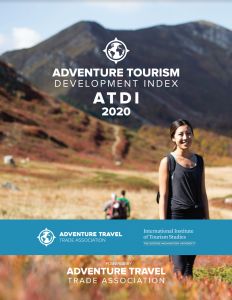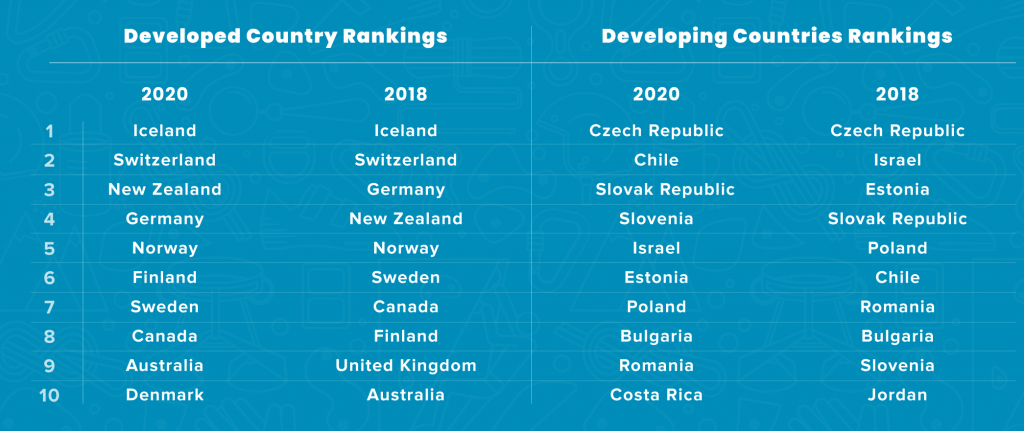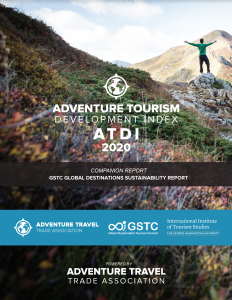Seattle, Washington - (May 27, 2020) - To help adventure travel destinations rebuild responsibly and remain competitive in a new environment shaped drastically by the COVID-19 pandemic, the Adventure Travel Trade Association (ATTA) and George Washington University International Institute of Tourism Studies (GW IITS) are pleased to release the 2020 Adventure Tourism Development Index (ATDI) Report and a companion GSTC Global Destination Sustainability Report, which combined take a look at the state of destination competitiveness and management across the globe.
 The ATDI report has served as a benchmarking and decision-making tool for destination planners and marketers since its inception in 2008. The latest report dives into the pillars that make an adventure destination competitive in changing times, and how 191 nations rank in their ability to welcome and host adventure travelers.
The ATDI report has served as a benchmarking and decision-making tool for destination planners and marketers since its inception in 2008. The latest report dives into the pillars that make an adventure destination competitive in changing times, and how 191 nations rank in their ability to welcome and host adventure travelers.
The release of this year’s report occurs while the world is in the midst of a global pandemic caused by the rapid spread of COVID-19 (coronavirus). The virus has effectively caused a total shutdown of the global tourism industry and is currently forecast to cost the industry 100 million jobs worldwide.
As destinations design their path to re-starting tourism in a post-pandemic world, the ATDI can be used in two ways.
First, ATTA believes that when tourists are able to travel again, they will be seeking out nature-based, adventure activities, which will be safer than crowded destinations. Destinations around the world will compete to capture the attention and the dollars of adventure tourists.
Secondly, the ATDI can be used as a tool for examining destination resiliency. In particular, Pillar 3, Health; Pillar 7, Entrepreneurship and Pillar 8, Humanitarian, provide important insight into a destination's readiness to cope with a public health crisis. It is likely that elements measured within these pillars, such as the number of hospital beds per resident, will become real concerns of future travelers when they select destinations.
This year’s report shows Iceland and the Czech Republic continue to maintain their leadership positions in the ATDI.
“Iceland has maintained its position on the index for three years in a row and the Czech Republic for four. Iceland ranks especially high in Adventure Activity Resources, and the country’s image and visitor experience are viewed positively by the expert panel. The Czech Republic on the other hand consistently scores good points across the 10 pillars measuring competitiveness, making it the most competitive adventure market amongst the developing nations,” remarked Christina Beckmann, Vice President, Global Strategy, at the ATTA.
Top 10 Developing and Developed Country Rankings - ATDI 2020

Among other notable findings, the 2020 ATDI suggests there are reasons to be optimistic about the future of adventure tourism. Countries are increasing their share of protected marine and terrestrial areas, increasing their efforts to mitigate climate change, and extending support to entrepreneurs. At the same time, corruption around the world is increasing, the extinction rate is rising, and big cities, especially in the developing world are becoming more densely populated—all indicators that reduce competitiveness.
“As our world faces increasingly severe crises—due to climate change, health pandemics, terrorism, and other mega-threats—only destinations that are healthy and have a solid sustainable management plan in place are likely to remain competitive in the long-term,” says Seleni Matus, Executive Director, International Institute of Tourism Studies at George Washington University.
 This year's ATDI report is published with a companion report ‘GSTC Global Destination Sustainability Report,’ which is designed to more deeply explore the sustainability dimension of adventure tourism competitiveness worldwide. This report is a product of a partnership with the Global Sustainable Tourism Council (GSTC). The companion report analyzes 24 destinations that have applied the GSTC Destination Criteria and Indicators. These geographically diverse destinations vary in their level of tourism development. When used as a companion piece to the ATDI, the GSTC analysis provides additional insights into destination sustainability challenges and opportunities. While the ATDI is focused on country-level competitiveness insights, the GSTC-D report is regional and local in scope. An in-depth side-by-side analysis of the ATDI and the GSTC-D is featured throughout the document.
This year's ATDI report is published with a companion report ‘GSTC Global Destination Sustainability Report,’ which is designed to more deeply explore the sustainability dimension of adventure tourism competitiveness worldwide. This report is a product of a partnership with the Global Sustainable Tourism Council (GSTC). The companion report analyzes 24 destinations that have applied the GSTC Destination Criteria and Indicators. These geographically diverse destinations vary in their level of tourism development. When used as a companion piece to the ATDI, the GSTC analysis provides additional insights into destination sustainability challenges and opportunities. While the ATDI is focused on country-level competitiveness insights, the GSTC-D report is regional and local in scope. An in-depth side-by-side analysis of the ATDI and the GSTC-D is featured throughout the document.
“We hope this pair of reports allow destination planners and marketers to gain fresh insights and consider a holistic approach to destination management, one that honors competitiveness in the marketplace and long-term sustainability, so that destinations can thrive economically, socially, and environmentally, benefitting all stakeholders in the ecosystem,” says Randy Durband, CEO, Global Sustainable Tourism Council.
The 2020 ATDI Report is available for a free download at this link.
The GSTC Global Destination Sustainability Report is available for download at this link.
The ATDI ranking dataset is available for download here.
###
About George Washington University International Institute of Tourism Studies (GWU IITS)
The George Washington University International Institute of Tourism Studies has been a global leader in tourism education and research for more than 30 years. Through professional partnerships, research and onsite consultations, it provides businesses, communities, governments and nonprofits with the guidance and information they need to develop a sustainable industry—one that balances the needs and interests of visitors with the economic and environmental realities of destinations worldwide.
To learn more, visit: https://business.gwu.edu/research/IITS.
About Global Sustainable Tourism Council (GSTC)
The Global Sustainable Tourism Council (GSTC) establishes and manages global sustainable standards, known as the GSTC Criteria. These are the guiding principles and minimum requirements that any tourism business or destination should aspire to reach in order to protect and sustain the world’s natural and cultural resources, while ensuring tourism meets its potential as a tool for conservation and poverty alleviation.
The GSTC represents a diverse and global membership, including UN agencies, NGO’s, national and provincial governments, leading travel companies, hotels, tour operators, individuals and communities – all striving to achieve best practices in sustainable tourism.
For more information, visit https://www.gstcouncil.org/.
About Adventure Travel Trade Association (ATTA)
Established in 1990, the Adventure Travel Trade Association (ATTA) today is widely recognized as a vital leadership voice and partner for the adventure travel industry around the world.
Membership + Trade
The membership and trade organization is designed to be a force for the industry and exists to drive thought leadership, industry promotion, and opportunities to network and convene globally to create trade and business health. It currently serves more than 1,300 member organizations in 100 countries worldwide. The constituency is made up of tour operators, tourism boards, specialty agents, and accommodations all sharing a vested interest in the sustainable development of adventure tourism.
Adventure 360 - Business Services + Events
Through its growing business services division, the ATTA delivers a portfolio of strategic solutions and a robust ecosystem of events around the globe. Those events include AdventureNEXT which focuses on regional promotion and partnerships; AdventureELEVATE a North American-based educational conference; and the premiere adventure travel global conference, the Adventure Travel World Summit. With specialized expertise in research, events, education, media, and promotion, the ATTA business service division is able to provide valuable solutions to a broad set of partners across many verticals of business.
Adventure Travel Conservation Fund
In 2016 the ATTA partnered with other leaders from the adventure travel industry to start the Adventure Travel Conservation Fund (ATCF), a nonprofit that provides funding, connections and an international spotlight on projects that protect the cultural and natural resources which underpin the adventure tourism industry. 100% of membership dues go towards funding these international projects. Each year members nominate projects, which are then vetted and finally voted upon by the ATCF membership.
For more information:
